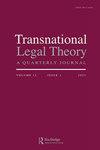Cop26及以后:参与和性别——更多的相同?
Q2 Social Sciences
引用次数: 0
摘要
本文在最近的《联合国气候变化框架公约》(UNFCCC)缔约方大会(CoP26)背景下探讨性别平等问题。性别平等问题在全球气候变化治理中得到广泛认可,并在其中发挥着持续的作用。缔约方会议不是孤立运作的,其制度设置非常重要,特别是在《联合国气候变化框架公约》组成机构和政府间气候变化专门委员会(IPCC)的工作中。联合国的其他部门,例如妇女地位委员会(第66届妇女地位委员会)也可以对性别问题作出重要贡献;公民社会在气候治理的这一方面也发挥着至关重要的作用。这些因素以及它们之间的相互作用形成了第26次缔约方会议的性别问题,全球大流行病也是如此。虽然性别平等是全球气候治理中的一个热点问题,但各国采取实质性行动解决这一问题仍然存在问题。本文章由计算机程序翻译,如有差异,请以英文原文为准。
Cop26 and beyond: participation and gender – more of the same?
ABSTRACT This article considers gender equality in the context of the most recent United Nations Framework Convention on Climate Change (UNFCCC) Conference of Parties (CoP), CoP26. Gender equality issues are now widely recognised within global climate change governance, playing an ongoing role within it. The CoP does not function in isolation and its regime setting is significant, in particular, in the work of UNFCCC constituted bodies and the Intergovernmental Panel on Climate Change (IPCC). Other parts of the United Nations, such as the Commission on the Status of Women (CSW66) can also offer important contributions to gender; and civil society too plays a vital role in this aspect of climate governance. These elements and the interplay between them have shaped gender issues at CoP26, as has the global pandemic. While gender equality is a live issue in global climate governance, leveraging substantial, substantive, action by states to address it remains problematic.
求助全文
通过发布文献求助,成功后即可免费获取论文全文。
去求助
来源期刊

Transnational Legal Theory
Social Sciences-Law
CiteScore
2.10
自引率
0.00%
发文量
7
期刊介绍:
The objective of Transnational Legal Theory is to publish high-quality theoretical scholarship that addresses transnational dimensions of law and legal dimensions of transnational fields and activity. Central to Transnational Legal Theory''s mandate is publication of work that explores whether and how transnational contexts, forces and ideations affect debates within existing traditions or schools of legal thought. Similarly, the journal aspires to encourage scholars debating general theories about law to consider the relevance of transnational contexts and dimensions for their work. With respect to particular jurisprudence, the journal welcomes not only submissions that involve theoretical explorations of fields commonly constructed as transnational in nature (such as commercial law, maritime law, or cyberlaw) but also explorations of transnational aspects of fields less commonly understood in this way (for example, criminal law, family law, company law, tort law, evidence law, and so on). Submissions of work exploring process-oriented approaches to law as transnational (from transjurisdictional litigation to delocalized arbitration to multi-level governance) are also encouraged. Equally central to Transnational Legal Theory''s mandate is theoretical work that explores fresh (or revived) understandings of international law and comparative law ''beyond the state'' (and the interstate). The journal has a special interest in submissions that explore the interfaces, intersections, and mutual embeddedness of public international law, private international law, and comparative law, notably in terms of whether such inter-relationships are reshaping these sub-disciplines in directions that are, in important respects, transnational in nature.
 求助内容:
求助内容: 应助结果提醒方式:
应助结果提醒方式:


